Atlantic Technology 201 User manual
- Category
- Loudspeakers
- Type
- User manual

System 370 THX
®
High Performance
THX Home Theater Loudspeaker System
Instruction Manual
Atlantic Technology
®
I
NNOVATIVE
H
OME
T
HEATER
Covers Models 371 LR, 373 C, and 374 SR
343 Vanderbilt Avenue Norwood, MA 02062 (781) 762-6300

2
Models 371 LR, 373 C, and 374 SR
Atlantic Technology
®
S
YSTEM
370 THX
High Performance THX Home Theater
Loudspeaker System
Congratulations on your purchase of the Atlantic Technology System 370 THX loudspeaker system.
With proper care, your new speaker system will provide many years of trouble-free, high quality sound
reproduction.
The System 370 THX was designed to provide accurate, uncompromised reproduction of high fidelity
music and movie soundtracks. Nothing was spared in the development of the speaker components and
cabinetry to provide superior performance, while maintaining an elegant, compact design that is easily
integrated into the home.
What Is Home THX?
A Home THX audio system is the ultimate in sound for multi-channel home
theater systems. The system incorporates a series of patented electronic and
loudspeaker developments designed to reproduce all multi-channel sources
accurately in the home environment. The driving force behind the creation of
Home THX was the observation that, in the home environment, conventional
audio components could not accurately reproduce soundtracks as they were
originally intended. Two basic requirements were identified:
1. A need to correct the audible tonal and spatial errors caused by the reproduction of movie
soundtracks designed for playback in large theaters in the smaller environment of the home.
2. A need to more accurately reproduce the complex and competing soundfields present in multi-
channel soundtracks.
Why THX Loudspeakers?
Conventional high fidelity loudspeakers, even very expensive ones, are not ideally suited to the
demands of multi-channel soundtracks. The Atlantic Technology System 370 THX is ideally
suited to the accurate reproduction of high fidelity music and multi-channel sound. Here’s why:
371 LR/373 C Front and Center Speakers
■
Wide horizontal dispersion improves coverage of the listening area.
■
Focused vertical directivity improves frontal localization and intelligibility.
■
Full dynamic range and frequency response
374 SR Surround Speakers
■
Diffuse radiation enhances envelopment and spaciousness.
■
Smooth power response matches the tonal character of the front and center channels.
■
Full dynamic range and frequency response for digital surround applications.

3
Models 371 LR, 373 C, and 374 SR
Atlantic Technology
®
372 PBM Subwoofer
■
High output level reproduces full dynamic impact.
■
Smooth in-room response down to 20Hz.
A Word About Digital Surround Technologies and THX
It is important to remember that THX technologies work in conjunction with whatever processing
technology it is paired. THX, on its own, is not a decoder or processor. It enhances and adapts the
surround sound processor it is paired with to more accurately reproduce movie soundtracks in the
home environment.
The new digital surround technologies, such as Dolby Digital
®
(AC-3
®
) and DTS
®
, offer dramatic
improvements in channel separation and dynamic range over conventional multi-channel analog
matrix formats such as Dolby Surround
®
and Dolby Pro Logic
®
. THX sound systems, with their
outstanding dynamic, spatial, and tonal performance, are ideally suited to convey the benefits of
digital multi-channel formats. THX technologies will continue to be essential for the accurate
reproduction of all multi-channel sources, both now, and in the future.
Connection
We recommend that you connect your new System 370 THX speaker components using high quality
wire of 16 gauge or larger. There are many respected manufacturers in the audio industry that
specialize in speaker wire and interconnect cables who make suitable products for your new system.
We recommend that you consult your local audio/video specialist for more specific information.
Warning: To prevent risk of electrical shock or damage to your equipment, always unplug all component
AC cords before proceeding with speaker and component connections! The last step in wiring your system is
plugging in the AC cords!
You can connect your System 370 THX speakers by using a variety of connectors, or by removing 1/2"
of insulation from each wire end, twisting the strands of wire together, placing the wire through one of
the post holes and screwing down the nut tightly. We recommend that you check your local electrical
codes to make sure you are not using an improper connector.
It is important to observe polarity while making speaker connections:
red (+) terminals on the amplifier to red (+) on the speaker, black (-)
on the amplifier to black (-) on the speaker. Look carefully at the
wires you are using and note that one of the wires in each pair is
marked by either a different color, printing, ridges, or a thread inter-
twined with the wire strands. By convention, the marked wire is
connected to the red (+) terminal.
Whether your are connecting a complete System 370 THX, or adding
one speaker or subwoofer to your present system, the wiring should usually look like the diagram in
Figure 2. When installing an Atlantic Technology subwoofer into your system, refer to the subwoofer’s
instruction manual for other wiring options. Before turning on the amplifier, be certain that no stray
wire strands are touching across the two terminals as this might damage your amplifier.
Figure 1:
Gold plated
5-way binding
posts. Accepts
up to 10 guage
bare wire

4
Models 371 LR, 373 C, and 374 SR
Atlantic Technology
®
Figure 2:
Typical wiring
diagram for
speakers in a
home THX theater.
Finally, check the polarity of your front speakers by listening to some music. If the sound seems
hollow, indistinct, and has weak bass, one of your speakers is out of phase. Recheck your connections
for proper polarity and reverse the connections if necessary.
Important: The Atlantic Technology 370 THX loudspeaker system will attain its peak performance after a
break-in period of approximately 50 hours at moderate volume levels. Higher volume levels will not hasten
this break-in period.
Speaker Placement
Atlantic Technology speakers will provide excellent, satisfying sound when properly placed in your
room. However, with the many variables in room layout and dimensions, there is no magical formula
for determining the best speaker placement in every room. The following section contains general
guidelines for speaker placement. Experiment to find where the speakers sound best in your particular
room. Use the following placement guidelines and Figure 3 as a starting point. Remember that small
changes in speaker positioning can make a big difference in the sound.
To optional
second
subwoofer

5
Models 371 LR, 373 C, and 374 SR
Atlantic Technology
®
Mounting
The Model 371 LR and Model 374 SR speakers can be mounted in a variety of ways:
On the wall. To surface mount your speakers on the wall, we have provided two steel keyhole
brackets already installed on the back panel of the cabinet. Simply place the large openings of the
bracket over the heads of pan-head screws (securely screwed into wall studs or wall anchors), and slide
the cabinet down onto the shaft of the screw. Ideally, the acoustic center of the speaker (the tweeter)
should be within two feet of ear level when you are in a seated position.
On optional pedestal stands. The pedestal stands are provided with complete instructions and all
necessary hardware required for installation. These stands allow placement flexibility and a stable base
for a variety of floor surfaces, including deep pile carpeting. The height of the pedestal stand is
matched to the speaker for optimum performance.
Positioning the Speakers
Place the Model 371 LR Front Speakers to the left and right of the TV screen. All of the System 370
THX speakers, except for the 374 SR surround speakers, are magnetically shielded and will not interfere
with the video image. The left front and right front speakers should be far enough apart that you get a
good stereo image, but not so far apart that the sound seems distant and distracting. Avoid placing the
speakers too close to a corner or too close to the TV, and try to maintain an equal distance from the
screen on both sides.
Figure 3:
Typical arrange-
ment for speakers
in a THX home
theater. For best
results, place the
surround speakers
within the shaded
areas. Note that
the surround
speakers are
marked Left and
Right. It is
important that the
speakers be placed
correctly for proper
imaging.
Null point of surround
speaker in line with
listening position
Center channel should be within
2' of front speaker tweeter height
Surround
speaker
should be
no closer
than 2' from
the ceiling
Ear level
Left surround
speaker
Right
surround
speaker

6
Models 371 LR, 373 C, and 374 SR
Atlantic Technology
®
The degree of front speaker toe-in can affect the imaging and response characteristics of the speakers.
In most rooms, the speakers will work well facing straight ahead or slightly toed-in towards the
listener. Speakers that are placed close to the side walls may require additional toe-in to avoid a poor
image and/or a forward midrange and treble response due to reflections from the side walls. Play some
two channel stereo music and experiment with speaker positioning.
Note: If the speakers need an excessive amount of toe-in to image properly, there may be a problem with the
connection of the speakers or some part of the system may not be operating properly. Check all of your
speaker wire connections for correct phase and verify that the associated components in the system are
connected and functioning properly.
The Model 373 C Center Channel Speaker should be centered between the left and right front
speakers and above or below the TV screen. It should be tilted on its adjustable base to direct the
sound toward the listening position. Ideally, the center channel speaker should be placed within two
feet of the axis of the front channel tweeters. This placement is somewhat flexible, however, because of
the directability of the 373 C on its tiltable base. The 373 C is usually placed on top of the TV, or above
or below the screen in a front projection video system.
The Boundary Compensation Control on the rear panel of the 373 C provides a unique way to
fine-tune the frequency balance of the speaker when it is placed on or near a reflective surface. In
many situations, the unfortunate audible result of placing a
speaker on top of a TV is a boost in the midrange response
from the sound reflecting off of the TV screen. This can often
result in harsh midrange and treble response and a blurring of
the sound when you are sitting off to the side.
Once you have the speaker in position, put on some music
or a movie with good center channel information. Sit down
and listen for a few minutes. If you find the midrange response
exaggerated, flip the switch to the boundary compensation
position. This will reduce the level of midrange frequencies.
Conversely, if there doesn’t seem to be enough midrange frequencies, if voices sound muffled for
example, flip the switch to the free air, THX reference position to increase these frequencies.
For free-air use, and to meet THX specifications, keep the switch of the boundary compensation
control in the THX position.
The Model 374 SR Surround Speakers should be placed at the sides of the room with the null
(the point of the triangle between the two sets of drivers) of the speakers aimed at the listening
position. Height of the surrounds should be between ear level and two feet above ear level.
If there is more than one row of seats, the surround speakers should be at the sides of the room at the
geometrical center of the seating positions. Some people prefer to have the surround speakers mounted
high up on the side walls, slightly behind the listening position. If this is the case, the speaker should
be mounted upside-down to position the tweeters at the bottom of the cabinet. This will acoustically
position the speaker lower on the wall. This mounting position can provide a larger sense of “space”
and may be the only choice in some rooms.
Figure 4:
Boundary
Compensation
Control on rear
panel of 373 C.

7
Models 371 LR, 373 C, and 374 SR
Atlantic Technology
®
The Model 372 PBM Powered Subwoofer should be placed in the front of the room, close to a
corner. Every room has its own unique sound, and flexibility in the exact placement of the subwoofer
is always desirable. In general, the closer the woofer is placed to a corner, the more bass response you
will hear. However, in many rooms, corner placement can produce too much bass and the subwoofer
will work best well away from the corner. Experiment to find the best position in your room. Refer to
the wiring diagrams in the subwoofer’s instruction manual for the correct wiring scheme for your
particular setup. Then proceed with listening.
Subwoofer Tuning
Start your listening with the high-pass filter set at 80Hz, the phase switch set to normal, and the
level control all the way down (counterclockwise). Play some music that you know has good bass
content, and turn the level control up until you just start to hear the subwoofer working. Now, sit in
your normal listening position and determine whether the subwoofer is playing loud enough and
filling in the bass frequencies of the music evenly. If it needs adjustment, change the setting of the
level control to compensate. If the bass still seems too heavy, move the subwoofer away from the
corner. If the bass seems too thin, move the subwoofer closer to the corner. Small differences in
positioning the subwoofer can make big differences in the overall bass response. When you find a
position that seems to work well, try switching the phase switch between its two settings, listening
closely for the smoothest bass response. Remember, the most common error is to play the
subwoofer too loudly.
Listening Levels and Power Handling
The power recommendation for these speaker components assumes that you will not operate your
amplifier/receiver in a way that produces distortion. Even rugged speakers like System 370 THX can be
damaged by a moderately powered system driven beyond its capabilities. The harsh amplifier clipping
that occurs in this situation may cause damage to the speaker system that is not covered by the
warranty. The System 370 THX will play very loudly when provided with enough clean power to do so.
Don’t starve your system for power! There are several suitable receivers, integrated amplifiers, and
multi-channel power amplifiers commonly available. Consult your local audio/video specialist for
additional information.
Care of your Speakers
Clean your speaker cabinets using a soft cloth and a mild, non-abrasive glass cleaner (such as Windex),
being careful not to wet the individual drivers or the edges of the cabinet. Spray the cloth, not the
cabinet. Do not rub, but lightly wipe the dust and fingerprints from the surface. A dusty grille is easily
cleaned by gently using a vacuum cleaner with a brush attachment on the grille fabric.
Avoid placing
your speakers in direct sunlight or near a source of heat that may, over time, fade the finish.
Important: Save Your Boxes! If you can do so, save the cartons, packing pieces, and plastic bags that
came with your speakers. They will be useful in case you move or have to ship your loudspeakers for any
reason. In any case, save all packing materials until you are certain that the systems have suffered no
damage in shipment. If you find such damage, either visible or internal, contact your dealer immediately for
the proper return procedure.

010-1370
System 370 THX Specifications
For Future Reference
Record your speaker(s) serial number(s) and date of purchase here:
Model Number Serial Number Date of Purchase
Model Number Serial Number Date of Purchase
Model Number Serial Number Date of Purchase
The serial number is found on the back of the speaker near the connecting terminals.
Model
371 LR 373 C 374 SR
Type Sealed-box, 3-way Sealed-box, 3-way, Sealed-box, TwinPolar™ (V-pole)
D’Appolito D’Appolito spatially-enhanced
Drivers (2) 6-1/2" coated composite (2) 6-1/2" coated composite molded (2) 5-1/4" coated composite
molded graphite woofers; graphite woofers molded graphite woofers;
(2) 3-1/2" coated composite (2) 3-1/2" coated composite molded (2) 3/4" silk dome tweeters,
molded graphite midrange drivers; graphite midrange drivers; neodymium magnet, ferrofluid cooled
(1) 1" silk dome tweeter, (1) 1" silk dome tweeter,
neodymium magnet, ferrofluid cooled neodymium magnet, ferrofluid cooled
Frequency 80Hz – 20kHz 80Hz – 20kHz 80Hz – 20kHz
Response (±3dB)
Nominal 8
Ω
8
Ω
8
Ω
Impedance
Crossover 350Hz – 4.5kHz 350Hz – 4.5kHz 3.5kHz
Frequency
Sensitivity 91dB 91dB 87dB
Recommended 100 – 200WRMS 100 – 200WRMS 100 – 200WRMS
Amplifier Power
Magnetic Shielding
Yes Yes No
Size (W x H x D) 7.5 x 23.65 x 11.375in 25.75 x 10.0 x 10.5in with base 7.875 x 18.7 x 7.25in
190 x 600 x 288mm 655 x 254 x 267mm with base 200 x 475 x 184mm
Weight (ea., unpacked) 27lbs; 12.25kg 25lbs; 11.35kg (28lbs; 12.71 with base) 12lbs; 5.45kg
Specifications are those in effect at the time of printing. Atlantic Technology reserves the right to change specifications or appearance at any time without
notice. THX and Lucasfilm are registered trademarks of Lucasfilm Ltd. Dolby Digital, AC-3, Dolby Stereo and Dolby Pro Logic are trademarks of Dolby
Laboratories Licensing Corporation. DTS is a registered trademark of DTS Technology.
-
 1
1
-
 2
2
-
 3
3
-
 4
4
-
 5
5
-
 6
6
-
 7
7
-
 8
8
Atlantic Technology 201 User manual
- Category
- Loudspeakers
- Type
- User manual
Ask a question and I''ll find the answer in the document
Finding information in a document is now easier with AI
Related papers
-
Atlantic Technology THX User manual
-
Atlantic Technology Atlantic System 350 THX THX Quick start guide
-
Atlantic Technology System 450 User manual
-
Atlantic Technology 372PBM User manual
-
Atlantic Technology AT-1 User manual
-
Atlantic Technology 350 THX User manual
-
Atlantic Technology 452PBM User manual
-
Atlantic Technology 350 THX User manual
-
Atlantic Technology System 4400 THX Select User manual
-
Atlantic Technology 272 PBM THX User manual
Other documents
-
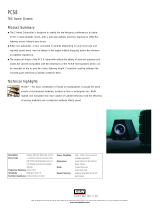 Bowers & Wilkins PCS8 User manual
Bowers & Wilkins PCS8 User manual
-
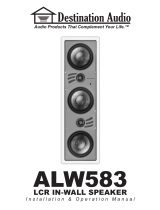 Destination Audio ALW583 Installation & Operation Manual
Destination Audio ALW583 Installation & Operation Manual
-
 Miller & Kreisel Sound LCR-750THX Operating instructions
Miller & Kreisel Sound LCR-750THX Operating instructions
-
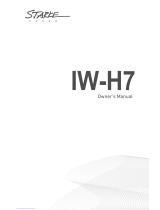 Starke sound IW-H7 Owner's manual
Starke sound IW-H7 Owner's manual
-
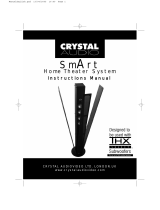 Crystal Acoustics Smart User manual
Crystal Acoustics Smart User manual
-
OEM Presence A-525 CC User manual
-
OEM Systems A-525 CC User manual
-
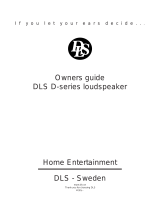 DLS Svenska AB D-Series User manual
DLS Svenska AB D-Series User manual
-
Pioneer HOME CINEMA SYSTEMS User manual
-
Atlantic IW-155 LCR User manual













